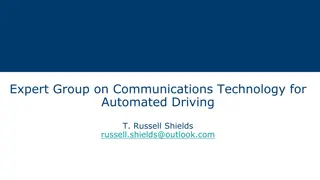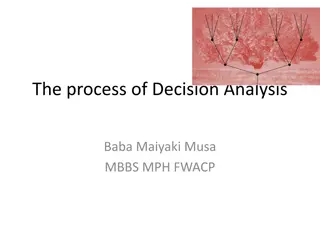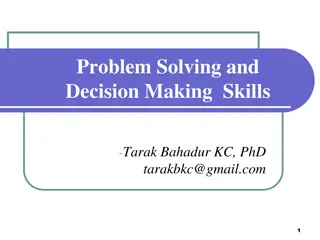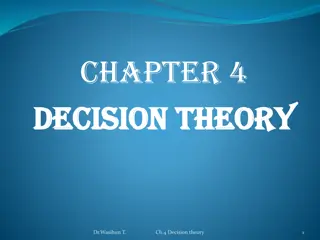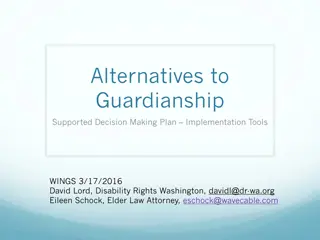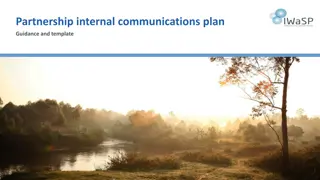Ex Parte Communications in Planning Decision-Making
Planning Commissions often base their decisions on various forms of input, including ex parte communications that occur outside of public hearings. Understanding the different types of decisions they make, such as legislative and quasi-judicial, is essential in ensuring a fair and transparent process.
Download Presentation

Please find below an Image/Link to download the presentation.
The content on the website is provided AS IS for your information and personal use only. It may not be sold, licensed, or shared on other websites without obtaining consent from the author.If you encounter any issues during the download, it is possible that the publisher has removed the file from their server.
You are allowed to download the files provided on this website for personal or commercial use, subject to the condition that they are used lawfully. All files are the property of their respective owners.
The content on the website is provided AS IS for your information and personal use only. It may not be sold, licensed, or shared on other websites without obtaining consent from the author.
E N D
Presentation Transcript
Ex Parte Communications Mono County Planning Commission November 16, 2023
Whatisan ex parte communication ? The Planning Commission takes action at public hearings. Ideally, all the bases for your decisions would be on the record and consist of public comments delivered in writing before the hearing, the staff report, attachments to the staff report, the staff presentation, and any public comment, including from an applicant. However, in real life, you often base your decisions on your personal experiences, your knowledge of the community, and things you hear and see out in the world prior to the hearing. Any communication about a matter within your jurisdiction that occurs outside of a hearing is called an ex partecommunication. Are ex partecommunications allowed? 2 2/24/2025 Mono County Planning Commission
Whats the standard lawyer answer ? It Depends ! 3 2/24/2025 Add a footer
Two kinds of decisions As a Planning Commission, you make two kinds of decisions. The distinction between the two is sometimes murky, but for simplicity's sake, let s describe it like this: Legislative: Sometimes you make broad policies that affect the entire community or some portion of it. When you do that, you act like a mini- legislature. Usually when you exercise this type of authority, you re making recommendations to the Board of Supervisors. Quasi-adjudicative: Other times you act a little like a court and make decisions that will apply to a particular site and/or applicant. In this case, sometimes you re the final decisionmaker, subject to appeal, and sometimes you re making a recommendation. 4 2/24/2025 Add a footer
The Planning Commission giveth and it taketh away For the sake of today s discussion, let s make up a category by dividing quasi-adjudicative actions into two kinds of decisions: Administrative: Sometimes when you act as a quasi-adjudicative body, you re being asked whether to confer an entitlement that a property owner didn t previously have. Let s call these giving types of decisions administrative decisions. This will help us with today s discussion. Quasi-judicial: These are the ultimate court-like decisions. Sometimes planning commissions have the power to revoke a vested entitlement. Or sometimes they have the power to review staff s imposition of fines or other penalties. Here, property owners rights are at their pinnacle, and your proceedings need to look a lot more like a real court hearing than with administrative decisions. So let s call these taking away decisions quasi-judicial . 5 2/24/2025 Add a footer
So back to our question Legislative action: ex parte communications are a-okay, subject to Brown Act compliance. Administrative action: ex parte communications are okay, subject to the Brown Act and some other caveats. Quasi-judicial action: to protect the integrity of your process and to help ensure the court upholds your decision if challenged, you should be extremely careful not to engage in ex parte communications. Let s talk about the caveats for administrative actions, and then we ll talk about the Brown Act. 6 2/24/2025 Add a footer
Caveats Disclose all ex parte communications on the record at the start of the hearing. I would go so far as to disclose a solo visit to the site. Just listen. It s also okay to ask questions that don t express judgment. You have a legal obligation to enter the hearing with an open mind . Having a closed mind is called common law bias, and it violates parties right to a fair hearing. Even if you enter the room with a strong inclination of how you re going to vote, you need to be prepared to change your mind if you hear something compelling. Therefore, it is extremely important that you not give any outward indication of partiality. If you express your views during an ex parte communication, you run the risk of appearing to have made up your mind in advance. 7 2/24/2025 Add a footer
Caveats You don t have to meet with anyone ex parte. But if you agree to meet with one side of an issue, you re agreeing to meet with anyone else who comes along who might want to talk to you. (Subject to your right within a margin of reason to protect yourself from unsafe circumstances.) That s not a law, but it s a corollary of the rule against common law bias. If you meet with one side but refuse to meet with the other, you look biased. 8 2/24/2025 Add a footer
Brown Act A meeting for purposes of the Brown Act can involve any active communication among at least a quorum of the Commission. (Note: i.e., a quorum of those who will vote which may be less than an ordinary quorum.) You re allowed to meet only in a properly notice public meeting. But that doesn t mean meetings don t occur in other contexts. It just means they shouldn t. 9 2/24/2025 Add a footer
Example of meetings Assume a body with five members: A, B, C, D, E. Example #1: A talks to B about an issue within the body s jurisdiction outside a noticed meeting. Then B talks to C about the same issue. That s a meeting, and it violates the Brown Act. Example #2: An applicant invites all members of the body to attend a noticed public meeting of another body to hear more about a pending project. A, B, and C all show up. All three are meeting, but it s okay if they address the body as part of the scheduled program because the meeting was noticed. Example #3: Now assume the meeting was open to the public but wasn t a noticed meeting of another public body. The applicant is the host. Again, A, B, and C show up. Problem? 10 2/24/2025 Add a footer
Examples of meetings Example #3 (cont d): Not if they don t talk amongst themselves or publicly as part of the meeting. If they all just listen, they can stay. But they might consider limiting their numbers to two members to avoid a problem. Example #4: Now assume the same facts as in Example #3 except that it was a private meeting hosted by the applicant only for members of the body. Steer clear or reduce your numbers to two. 11 2/24/2025 Add a footer
Examples of meetings Example #5: Now assume that instead of hosting a meeting, the applicant just emailed all the members, and one of the members responds to the applicant by hitting reply all, so that there s now an active communication among the members. Avoid this situation. Don t hit reply all. You re allowed to all passively receive the same email communication, but you cannot discuss issues amongst yourselves through email. Example #6: Assume that an applicant has an ex parte communication with A, and A asks various questions and expresses certain opinions. Then the applicant talks to B and C and shares with each of them what A had to say. That s a meeting, so be careful what you share with people when you meet with them. 12 2/24/2025 Add a footer
Examples of meetings Example #7: A posts about a project on social media. B likes the post and reposts it. C sees the post and likes it too. Meeting. The Brown Act contains special provisions that allow members of public bodies to communicate with constituents on social media, but members cannot use social media platforms to communicate amongst themselves. But even if you don t use social media to communicate amongst yourselves, you re still running the risk of appearing biased. Especially avoid posting on social media about quasi-adjudicative matters. 13 2/24/2025 Add a footer
What questions do you have ? 14 2/24/2025 Add a footer




